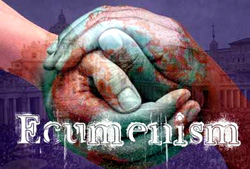The official dialogue between the Catholic Church and the mainline Protestant Churches -- Anglican, Lutheran, Reformed and Methodist -- is entering a new phase, says the president of the Pontifical Council for Promoting Christian Unity.
Cardinal Walter Kasper pointed this out Thursday during a press conference at the Vatican press office to present a book produced by the council titled "Harvesting the Fruits: Basic Aspects of Christian Faith in Ecumenical Dialogue. With this book, we are at the end of the first stage, which has been full of fruits and, at the same time, we are entering a new phase, which we hope will be fruitful and that the difficult problems that are pending will be resolved," the cardinal said.
In regard to the harvesting of the fruits of the dialogue, referred to in the book's title, Cardinal Kasper said that "it is really a very rich harvest, which overcomes the numerous controversies and great historical problems of the Reformation."
"We wish to begin a process of reception of these rich fruits in the body of the Church itself, to come to a new kind of ecumenical behavior," he revealed.
"By illustrating the numerous positive results of these 40 years, we want to show that we are capable of obtaining anything if we continue to be committed to ecumenism."
The book also includes areas of ecumenical convergence, which could help in the process of reception of the results in the different Churches. With regard to problems to be resolved, Cardinal Kasper explained that "[w]e have identified problems in hermeneutics, in anthropology, in ecclesiology and also in understanding of the Eucharist."
The official explained that the book is structured in four chapters: "Principles of Our Common Faith," "Salvation, Justification and Sanctification," "The Church" and "Baptism and Eucharist."
Cardinal Walter Kasper pointed this out Thursday during a press conference at the Vatican press office to present a book produced by the council titled "Harvesting the Fruits: Basic Aspects of Christian Faith in Ecumenical Dialogue. With this book, we are at the end of the first stage, which has been full of fruits and, at the same time, we are entering a new phase, which we hope will be fruitful and that the difficult problems that are pending will be resolved," the cardinal said.
In regard to the harvesting of the fruits of the dialogue, referred to in the book's title, Cardinal Kasper said that "it is really a very rich harvest, which overcomes the numerous controversies and great historical problems of the Reformation."
"We wish to begin a process of reception of these rich fruits in the body of the Church itself, to come to a new kind of ecumenical behavior," he revealed.
"By illustrating the numerous positive results of these 40 years, we want to show that we are capable of obtaining anything if we continue to be committed to ecumenism."
The book also includes areas of ecumenical convergence, which could help in the process of reception of the results in the different Churches. With regard to problems to be resolved, Cardinal Kasper explained that "[w]e have identified problems in hermeneutics, in anthropology, in ecclesiology and also in understanding of the Eucharist."
The official explained that the book is structured in four chapters: "Principles of Our Common Faith," "Salvation, Justification and Sanctification," "The Church" and "Baptism and Eucharist."
The second chapter focuses on a central issue of the Reformation -- salvation, justification and sanctification -- in which "a significant agreement has been achieved that constitutes a milestone in ecumenical relations," explained Monsignor Langham. The fourth chapter addresses, for example, the controversy over the Eucharist that existed during the Reformation, about which "thanks to an intense dialogue and above all to a renewed emphasis on the function of the Holy Spirit, it has been possible to arrive at an important convergence," stated the official.







